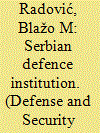| Srl | Item |
| 1 |
ID:
188280


|
|
|
|
|
| Summary/Abstract |
The Republic of Serbia has been an independent state since 2006, after the separation of Montenegro, which for the first time in modern history (since 1918) led to the need for all intelligence and security services, which previously had belonged to various state communities within Serbia, to be reconstituted as Serbian national services. In creating the Serbian intelligence and security system, there was a lot of wandering, unclear solutions, and misunderstandings—understandable given the historical and political context in which the creation of the system took place. The Serbian intelligence and security system consists of three services coordinated by the Coordination Bureau, which belongs to the National Security Council. The Serbian security intelligence system will undoubtedly go through many transformations in Serbia’s accession to the European Union. With this article, we have tried to present the current solutions in this system, which represent the basis for further transformations and adaptation of the system to the needs of modern Serbian society.
|
|
|
|
|
|
|
|
|
|
|
|
|
|
|
|
| 2 |
ID:
161347


|
|
|
|
|
| Summary/Abstract |
The uncritical layering of western liberal defence governance norms and concepts on top of existing legacy concepts has impeded achieving coherent military capabilities and capacities when Serbia’s political and military leadership tried to reform the defence system using Western benchmarking principles and Western countries’ best practices. The process of this change has been more valuable than its actual output, as defined by increased capabilities. Such outcomes should be reflective of policy guidance, and can be thought of as closing the trinity loop of a defence planning system: plans, money and execution. This article addresses two key functional areas of the Serbian defence institution. First, it assesses the current state of defence planning to discern its strengths and weaknesses to ascertain if plans are tied to financial decision-making. Second, a full examination of current Serbian defence management is conducted to discern whether weaknesses exist that distract from producing operational capabilities. Both areas are analyzed thoroughly and some solutions for change are proposed. Also, the article analyzes the appearance of two negative phenomena in the planning process – economization and managerialism.
|
|
|
|
|
|
|
|
|
|
|
|
|
|
|
|